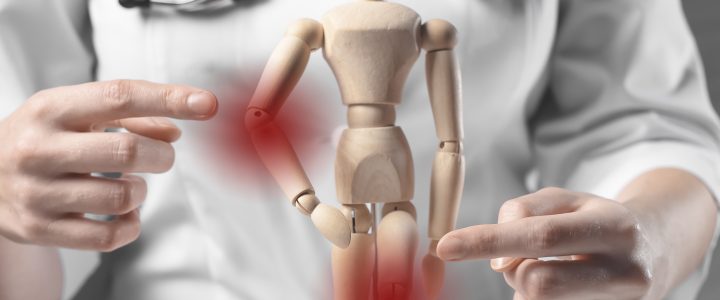Gout is a form of arthritis that occurs when the body’s uric acid levels rise and cause inflammation in the joints. The physiological saturation zone is 7.6 mg/dl (milligrams/deciliter)). If this happens, monosodium-urate crystals form and are stored in cartilage and the periarticular tissues of peripheral joints.
The continuous deposit is not visible from a clinical perspective. Nearly 10% of patients have hyperuricemia and develop clinical gout. Acute gout, on the other hand is a painful condition that affects only one joint. Chronic gout can be described as a series of painful episodes and inflammation that affects more than one joint. You can learn more about Gout here: Gout Symptoms
The Prognosis for the Disease
Most people can live a normal lifestyle if the disease is detected early in the symptoms. Other people in advanced age may experience the disappearance or functional improvement of their joints due to a reduction in blood uric acid.
Gout can be more severe when symptoms first appear before the age 30. Gout patients can die prematurely from heart disease and metabolic syndrome. Sometimes, treatment is not effective for patients. Reasons could include poor follow-up, low dosages of drugs, or alcoholism. This is a channel exclusively about Gout: Gout Home Remedy
Gout Symptoms
Acute gout symptoms include:
- Affected joints may only be one or two. Most often, the joints of the big toe and ankle are affected.
- In many cases, the pain begins suddenly and can be felt throughout the night. The pain can be described as intense, throbbing, squeezing, or excruciating.
- It is reddish-brown in color. The joint is often tender and swollen. You can put a sheet or cushion on top of it to create a sensation of pain.
- Fever may develop.
- Although the outbreak will usually disappear within a few days it can return periodically. Additional flare-ups can last longer.
- Gout patients will no longer experience symptoms after the initial flare-up. Many people will experience a second flare-up within 6-12 months.
- Gouty arthritis, also known as chronic gout, can be a condition that some sufferers develop. Gouty arthritis can cause joint damage and reduce movement. This chronic gout can cause joint pain and other symptoms.
What causes Gout?
Gout occurs when the body’s uric acid levels are higher than the normal range. This can happen when your body produces too much or if it has trouble eliminating uric acids. You can learn about natural treatments for gout here: Home Remedies For Gout
Uric acid crystals form when too much uric acids accumulates around joints. These crystals can cause joint inflammation, which can lead to swelling, pain, and an increase in temperature. The exact cause of gout has not been identified. Gout can be inherited and men, women postmenopausal and alcoholics are all more at risk. Gout is more common as we age.
Gout can also manifest in people who are:
- Diabetes
- Kidney disease
- Obesity
- Sickle cell and other anemias
- Leukemia and other types of blood cancers
- People who take medications that inhibit the elimination of uric acid may develop gout. Some medications, like hydrochlorothiazide or other diuretics can cause an increase in uric acid levels.
Is it possible to prevent it?
Gout can be prevented. However, the patient can minimize the risk factors that could cause gout symptoms. Gout can be prevented by taking medication to lower uric acid. The best natural supplement against gout can be obtained here: Gout Treatment



